-
 Bitcoin
Bitcoin $76,444.7530
-3.77% -
 Ethereum
Ethereum $1,473.8355
-5.46% -
 Tether USDt
Tether USDt $0.9991
-0.08% -
 XRP
XRP $1.7965
-5.51% -
 BNB
BNB $553.4919
-0.36% -
 USDC
USDC $0.9999
-0.02% -
 Solana
Solana $105.2981
-1.74% -
 TRON
TRON $0.2303
0.81% -
 Dogecoin
Dogecoin $0.1422
-4.62% -
 Cardano
Cardano $0.5587
-4.41% -
 UNUS SED LEO
UNUS SED LEO $8.9866
1.01% -
 Toncoin
Toncoin $2.9933
-4.74% -
 Chainlink
Chainlink $10.9113
-4.81% -
 Stellar
Stellar $0.2215
-4.76% -
 Avalanche
Avalanche $16.1163
-3.29% -
 Sui
Sui $1.9371
-3.89% -
 Shiba Inu
Shiba Inu $0.0...01065
-6.69% -
 Hedera
Hedera $0.1469
-3.29% -
 MANTRA
MANTRA $6.2058
-1.53% -
 Dai
Dai $1.0000
0.01% -
 Bitcoin Cash
Bitcoin Cash $269.3457
-2.08% -
 Polkadot
Polkadot $3.3773
-5.87% -
 Litecoin
Litecoin $69.2204
-2.50% -
 Ethena USDe
Ethena USDe $0.9986
-0.01% -
 Bitget Token
Bitget Token $4.0180
-3.25% -
 Pi
Pi $0.5649
-4.50% -
 Hyperliquid
Hyperliquid $11.1928
-2.80% -
 Monero
Monero $195.3885
-4.41% -
 OKB
OKB $50.9235
-0.59% -
 Uniswap
Uniswap $4.7688
-6.95%
How to optimize mining equipment for IPFS mining?
Maximize IPFS mining returns by prioritizing ample storage (HDDs or SSDs), high-bandwidth internet, and efficient software configuration. Regular system maintenance and network monitoring are crucial for sustained profitability.
Mar 19, 2025 at 11:29 pm
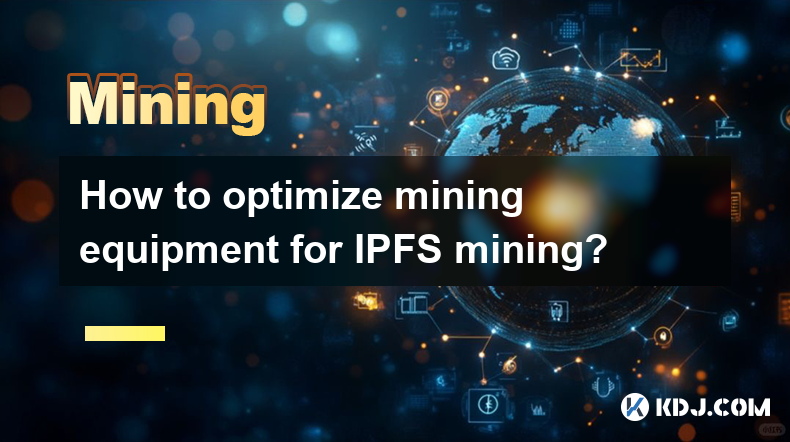
Key Points:
- Understanding IPFS Mining Differences: IPFS mining differs significantly from traditional cryptocurrency mining. It focuses on storage and bandwidth contribution rather than solving complex cryptographic puzzles.
- Hardware Selection: Prioritize storage capacity (HDDs or SSDs), network bandwidth, and processing power (CPU). Specific hardware requirements depend on your chosen IPFS storage provider.
- Optimizing Storage: Efficient file organization, data deduplication techniques, and regular system maintenance are crucial for optimal storage performance.
- Network Optimization: A high-speed internet connection with low latency is paramount. Proper router configuration and network security are also vital.
- Software Configuration: Choosing the right IPFS client and configuring it optimally for your hardware is essential for maximizing mining efficiency.
- Monitoring and Maintenance: Regular monitoring of hardware performance, network connectivity, and storage space is crucial for maintaining optimal mining operations.
How to Optimize Mining Equipment for IPFS Mining?
IPFS (InterPlanetary File System) mining isn't like Bitcoin mining. You're not solving complex mathematical problems. Instead, you're providing storage space and bandwidth to the IPFS network. This means optimizing your equipment focuses on different aspects than traditional cryptocurrency mining.
1. Choosing the Right Hardware:
The core of IPFS mining lies in storage and bandwidth. Therefore, selecting appropriate hardware is critical. While powerful CPUs are helpful for processing requests, prioritizing ample storage (HDDs or SSDs) and a robust network connection is more important. The specific requirements will vary depending on your chosen IPFS storage provider and your desired storage capacity.
- Consider using Solid State Drives (SSDs) for faster access speeds if you prioritize speed over capacity.
- High-capacity Hard Disk Drives (HDDs) are ideal for maximizing storage at a lower cost per gigabyte.
- Ensure your chosen hardware is compatible with the IPFS client software you plan to use.
2. Optimizing Storage:
Efficient storage management directly impacts your mining profitability. Consider these strategies:
- File Organization: Organize your storage space logically, making it easier to locate and access files. This improves efficiency and reduces search times.
- Data Deduplication: Employ deduplication techniques to avoid storing multiple copies of the same data. This saves significant storage space and improves efficiency.
- Regular Maintenance: Regularly run disk checks, defragment your drives (if using HDDs), and clear unnecessary files to maintain optimal storage performance and prevent potential data loss.
3. Network Optimization:
A fast and stable internet connection is crucial for IPFS mining. Consider these points:
- High-Speed Internet: Invest in a high-speed internet connection with low latency. Upload and download speeds directly affect your ability to contribute to the network.
- Router Configuration: Configure your router to prioritize IPFS traffic, ensuring it receives sufficient bandwidth.
- Network Security: Implement robust network security measures to protect your equipment and data from unauthorized access and malicious attacks.
4. Software Configuration:
Choosing and configuring the right IPFS client is essential.
- IPFS Client Selection: Select a reliable and efficient IPFS client software that is compatible with your operating system and hardware. Popular choices include the official Go-IPFS client.
- Client Configuration: Carefully configure your IPFS client, optimizing settings for your specific hardware and network configuration. This may involve adjusting parameters related to storage, bandwidth, and peer connections. Consult the client's documentation for optimal settings.
5. Monitoring and Maintenance:
Continuous monitoring and regular maintenance are crucial for maximizing your IPFS mining efficiency.
- Hardware Monitoring: Regularly monitor your hardware’s performance (CPU, RAM, disk I/O, network usage) to identify potential bottlenecks or issues.
- Network Monitoring: Monitor your network connection’s stability and speed to ensure optimal performance.
- Storage Monitoring: Regularly check your storage usage and free space to avoid running out of storage.
- Software Updates: Keep your IPFS client and operating system updated to benefit from performance improvements and security patches.
Common Questions:
Q: What is IPFS mining?
A: IPFS mining involves contributing storage space and bandwidth to the IPFS network, unlike traditional cryptocurrency mining which focuses on solving complex mathematical problems. You earn rewards for providing these resources.
Q: What hardware is best for IPFS mining?
A: Prioritize large storage capacity (HDDs or SSDs for speed), a high-speed internet connection with low latency, and a reasonably powerful CPU. The specific requirements depend on your storage provider.
Q: How much can I earn from IPFS mining?
A: Earnings vary widely depending on your storage capacity, bandwidth, network connectivity, and the chosen provider's reward system. It's not a guaranteed high-income activity.
Q: Is IPFS mining profitable?
A: Profitability depends on various factors, including hardware costs, electricity expenses, and the fluctuating value of rewards. A thorough cost-benefit analysis is necessary before starting.
Q: Are there risks involved in IPFS mining?
A: Risks include hardware failures, network outages, potential changes in reward structures from providers, and the general volatility of the cryptocurrency market. Data loss is also a concern.
Q: How do I get started with IPFS mining?
A: Research different IPFS storage providers, select the appropriate hardware, install the IPFS client software, and follow the provider's instructions to register and start contributing storage and bandwidth. Thorough research is recommended.
Disclaimer:info@kdj.com
The information provided is not trading advice. kdj.com does not assume any responsibility for any investments made based on the information provided in this article. Cryptocurrencies are highly volatile and it is highly recommended that you invest with caution after thorough research!
If you believe that the content used on this website infringes your copyright, please contact us immediately (info@kdj.com) and we will delete it promptly.
- "Cardano (ADA) Price Could Dip Below $0.60, Following Previous Market Cycle"
- 2025-04-09 05:10:12
- BONK, the well-known meme coin, has risen over 35% in the last week, attracting meme coin investors in the market. So, what caused this rally?
- 2025-04-09 05:10:12
- Bitcoin (BTC) Investors May Not Exactly Feel It, but BTC Has Been a Relatively Good Bet
- 2025-04-09 05:05:12
- Donald's Bitcoin (DONBTC) Could Turn Early Investors into Multi-Millionaires, Like Shiba Inu (SHIB) and Dogecoin (DOGE) Did
- 2025-04-09 05:05:12
- 6 Upcoming Kraken Listings That Could Be the Next Big Thing in Crypto
- 2025-04-09 05:00:13
- COTI Unveils New Privacy-Focused Blockchain to Reshape Web3 Transactions
- 2025-04-09 05:00:13
Related knowledge
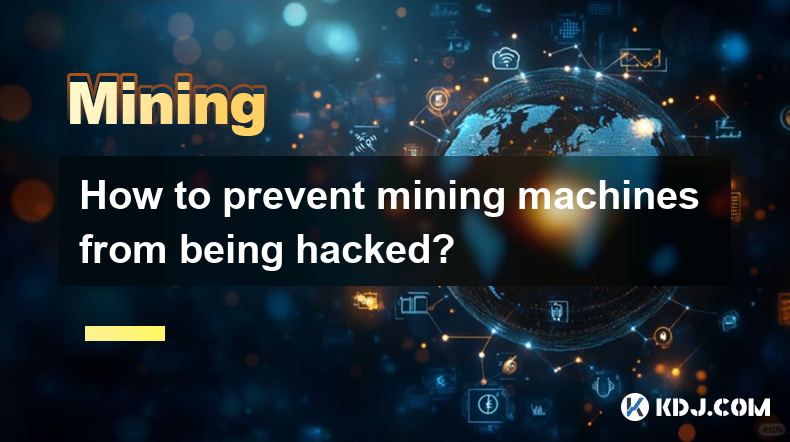
How to prevent mining machines from being hacked?
Apr 08,2025 at 09:00pm
In the world of cryptocurrency, mining machines play a crucial role in securing networks and validating transactions. However, these machines are also prime targets for hackers looking to exploit vulnerabilities for financial gain. Preventing mining machines from being hacked requires a multi-faceted approach that includes robust security measures, regu...
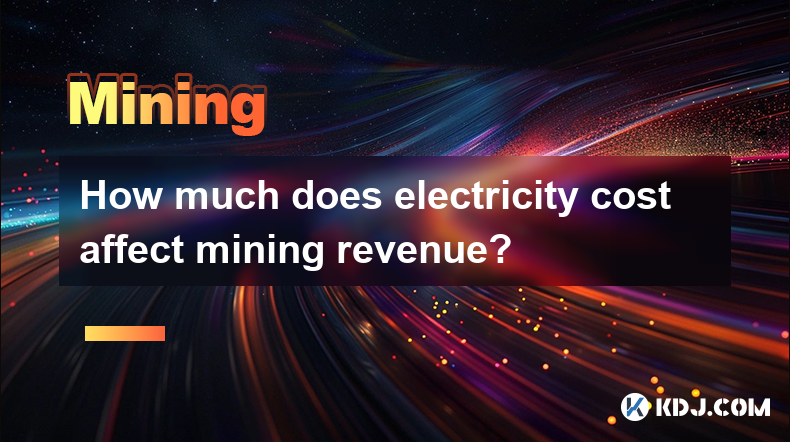
How much does electricity cost affect mining revenue?
Apr 08,2025 at 05:29pm
The cost of electricity plays a crucial role in determining the profitability of cryptocurrency mining. Mining revenue is directly impacted by the expenses incurred in running mining equipment, with electricity costs often being the most significant operational expense. Understanding how electricity costs affect mining revenue is essential for miners lo...
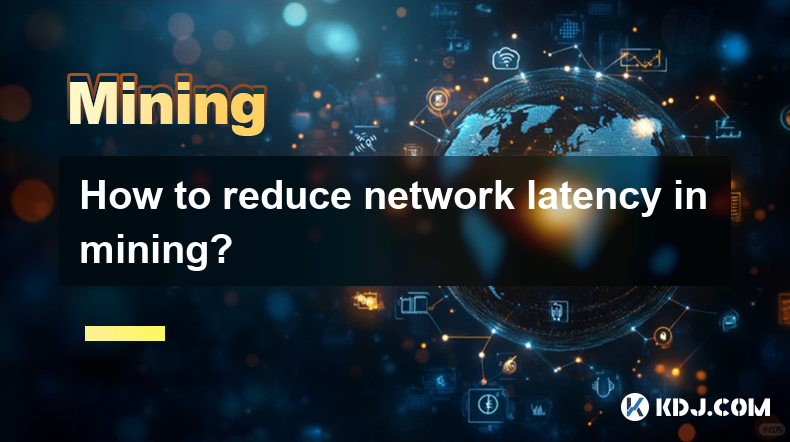
How to reduce network latency in mining?
Apr 09,2025 at 02:28am
Understanding Network Latency in MiningNetwork latency is a critical factor in the world of cryptocurrency mining. It refers to the time it takes for data to travel from its source to its destination across a network. In mining, lower latency can mean the difference between successfully adding a block to the blockchain and missing out on the reward. Red...

What is hashrate fluctuation?
Apr 08,2025 at 08:08pm
Hashrate fluctuation refers to the changes in the total computational power used by miners to process transactions and secure the blockchain network. This metric is crucial in the cryptocurrency world, particularly for networks like Bitcoin, Ethereum, and others that rely on proof-of-work (PoW) consensus mechanisms. Understanding hashrate fluctuation is...

Why does mining require a full node?
Apr 08,2025 at 06:49pm
Mining in the cryptocurrency world is a complex process that involves verifying transactions and adding them to the blockchain. One of the key components required for mining is a full node. But why is a full node necessary for mining? Let's delve into the reasons and explore the intricacies of this requirement. What is a Full Node?A full node is a progr...
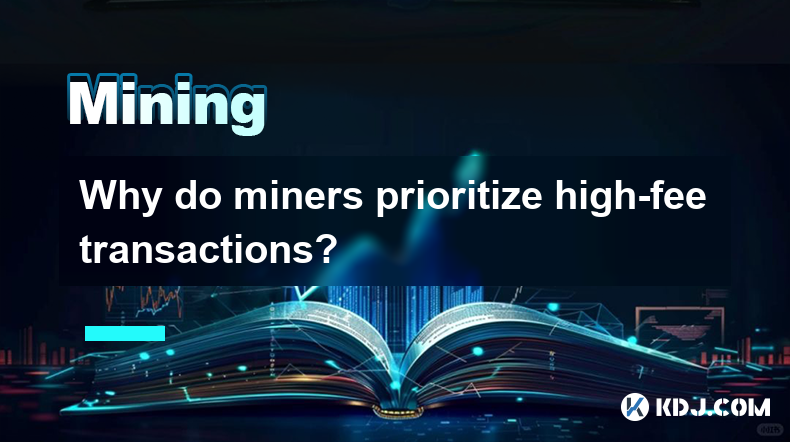
Why do miners prioritize high-fee transactions?
Apr 08,2025 at 05:01pm
Miners in the cryptocurrency ecosystem, particularly in networks like Bitcoin, play a crucial role in validating and adding transactions to the blockchain. One of the key factors that influence their decision-making process is the transaction fee associated with each transaction. Miners prioritize high-fee transactions primarily because these fees direc...

How to prevent mining machines from being hacked?
Apr 08,2025 at 09:00pm
In the world of cryptocurrency, mining machines play a crucial role in securing networks and validating transactions. However, these machines are also prime targets for hackers looking to exploit vulnerabilities for financial gain. Preventing mining machines from being hacked requires a multi-faceted approach that includes robust security measures, regu...

How much does electricity cost affect mining revenue?
Apr 08,2025 at 05:29pm
The cost of electricity plays a crucial role in determining the profitability of cryptocurrency mining. Mining revenue is directly impacted by the expenses incurred in running mining equipment, with electricity costs often being the most significant operational expense. Understanding how electricity costs affect mining revenue is essential for miners lo...

How to reduce network latency in mining?
Apr 09,2025 at 02:28am
Understanding Network Latency in MiningNetwork latency is a critical factor in the world of cryptocurrency mining. It refers to the time it takes for data to travel from its source to its destination across a network. In mining, lower latency can mean the difference between successfully adding a block to the blockchain and missing out on the reward. Red...

What is hashrate fluctuation?
Apr 08,2025 at 08:08pm
Hashrate fluctuation refers to the changes in the total computational power used by miners to process transactions and secure the blockchain network. This metric is crucial in the cryptocurrency world, particularly for networks like Bitcoin, Ethereum, and others that rely on proof-of-work (PoW) consensus mechanisms. Understanding hashrate fluctuation is...

Why does mining require a full node?
Apr 08,2025 at 06:49pm
Mining in the cryptocurrency world is a complex process that involves verifying transactions and adding them to the blockchain. One of the key components required for mining is a full node. But why is a full node necessary for mining? Let's delve into the reasons and explore the intricacies of this requirement. What is a Full Node?A full node is a progr...

Why do miners prioritize high-fee transactions?
Apr 08,2025 at 05:01pm
Miners in the cryptocurrency ecosystem, particularly in networks like Bitcoin, play a crucial role in validating and adding transactions to the blockchain. One of the key factors that influence their decision-making process is the transaction fee associated with each transaction. Miners prioritize high-fee transactions primarily because these fees direc...
See all articles






















































































